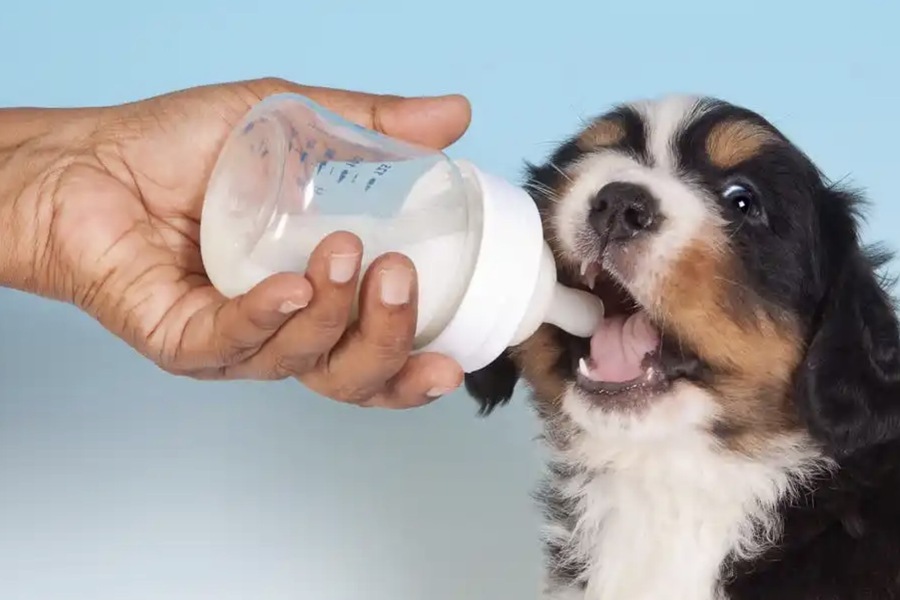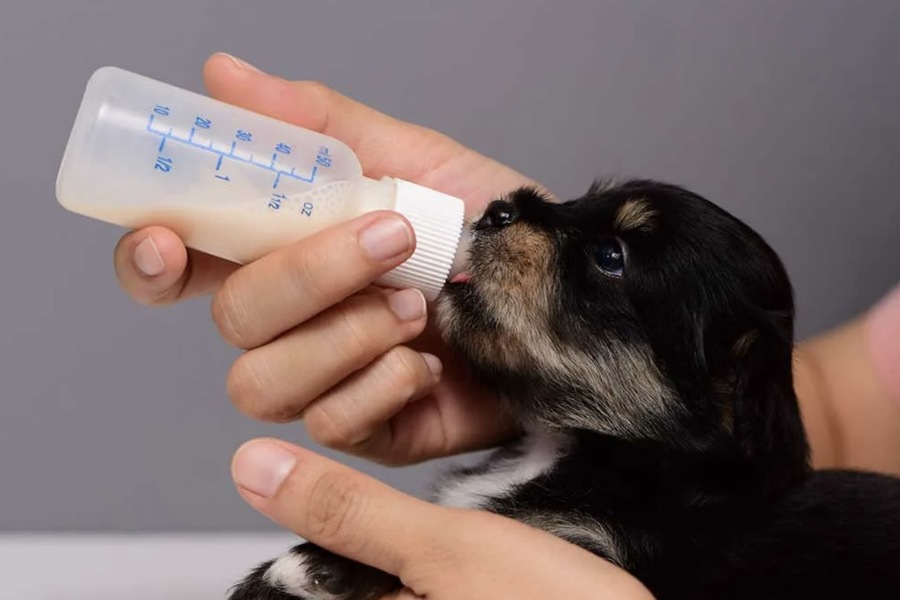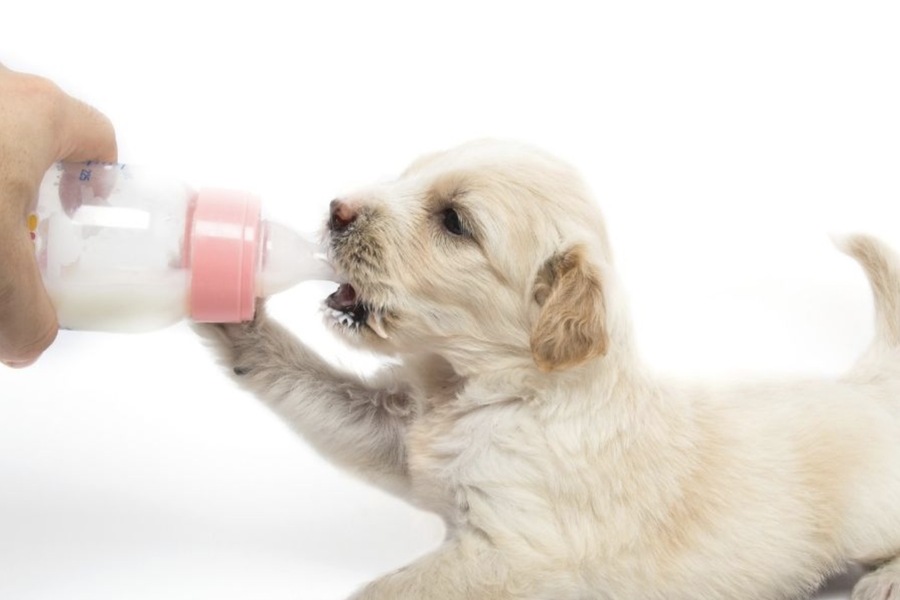Malnourished puppies, whether due to abandonment, maternal neglect, or health complications, require specific care to ensure survival and recovery. A balanced and highly nutritious diet is essential to support their growth and immune systems, and in many cases, regular feeding may not suffice. This is where a puppy milk replacer plays a critical role. These products are formulated to mimic the composition of a mother dog’s milk, providing essential nutrients in a way that malnourished puppies can easily digest and absorb.
Understanding Malnourishment in Puppies
Malnourishment in puppies can arise from various factors, including inadequate access to their mother’s milk, early separation from the mother, or underlying health issues that prevent proper nutrient absorption. Signs of malnutrition include slow growth, a weakened immune system, lethargy, and poor coat quality. These issues can significantly impact a puppy’s development if not addressed promptly. Without intervention, malnourished puppies face a higher risk of infections, bone deformities, and, in extreme cases, death.
To combat malnutrition, puppies need a concentrated source of nutrition that addresses both their immediate caloric needs and their longer-term growth requirements. This is where puppy milk replacers become indispensable.
Why Regular Milk Is Not Enough
One of the common misconceptions is that feeding malnourished puppies cow’s milk can help them recover. However, cow’s milk lacks the specific nutrient balance required by puppies and contains higher levels of lactose, which can lead to digestive upset, diarrhea, and further malnourishment. Puppy milk replacers, by contrast, are specifically designed to provide the necessary balance of protein, fat, vitamins, and minerals to promote healthy development. These products typically contain higher levels of fat and protein than cow’s milk, as well as essential fatty acids, amino acids, and other micronutrients that are vital for growth.
In Dubai and the UAE, where pet ownership and the care of stray animals are steadily increasing, ensuring the right nutritional support for malnourished puppies is crucial. Veterinarians in the region commonly recommend puppy milk replacers to restore health in such cases.

Nutritional Composition of Puppy Milk Replacers
Puppy milk replacers are formulated to closely replicate the nutritional profile of a mother dog’s milk. They typically contain between 30% to 40% fat, around 30% protein, and essential nutrients such as calcium, phosphorus, and vitamins like A, D, and E. These nutrients support bone development, immune function, and overall growth.
The high fat content is especially important for malnourished puppies, as fat is a primary energy source. Puppies have high energy needs due to their rapid growth rate, and without sufficient fat in their diet, they can become lethargic and underdeveloped. Protein, on the other hand, is essential for tissue repair and muscle development. The amino acids present in the protein help in building muscle mass and repairing any damage caused by malnutrition.
Additionally, these replacers include probiotics and digestive enzymes, which help malnourished puppies to digest and absorb nutrients more efficiently. Puppies with a compromised digestive system may struggle to absorb nutrients from regular food, making the easily digestible composition of milk replacers essential for their recovery.
The Role of Puppy Milk Replacers in Supporting Immune Function
Malnourished puppies are often more susceptible to infections due to their weakened immune systems. The immune-boosting properties of puppy milk replacers, particularly those fortified with colostrum, are vital for these vulnerable animals. Colostrum, the first milk produced by the mother immediately after birth, contains high levels of antibodies that help to protect the newborn from diseases.
While not all puppy milk replacers contain colostrum, some formulations are enriched with immunoglobulins, which offer similar immune-boosting benefits. These antibodies can provide temporary immunity while the puppy’s own immune system develops, offering a crucial layer of protection during the early stages of rehabilitation. This is particularly important in regions like Dubai and the UAE, where the hot climate can increase the risk of dehydration and infections, making robust immune support a necessity for recovering puppies.
Feeding Frequency and Techniques for Malnourished Puppies
Feeding malnourished puppies requires careful planning and frequent feedings to ensure they regain their strength without overwhelming their digestive systems. Veterinarians recommend feeding small amounts every two to four hours, depending on the puppy’s condition and weight. Overfeeding can cause digestive issues, while underfeeding may prolong malnutrition.
In the UAE, where access to specialized veterinary care is readily available, feeding schedules can be tailored based on the puppy’s unique needs. Most milk replacers come with clear instructions on the appropriate amount for different stages of puppy development. Feeding through a bottle with a nipple designed for puppies ensures the right flow of milk, preventing choking and aspiration.
When feeding malnourished puppies, it’s crucial to monitor their weight regularly. A steady increase in weight is a good indicator that the puppy is absorbing nutrients and recovering. However, any signs of digestive upset or failure to gain weight should be addressed immediately with a veterinarian.
Addressing Long-Term Recovery Needs
Puppy milk replacers not only serve as an immediate source of nutrition but also lay the foundation for long-term health. As the puppy begins to recover from malnutrition, the transition to solid food must be handled carefully. Typically, once a puppy is around four weeks old, solid food can be introduced gradually alongside milk replacer feedings.
In the UAE, where the pet care industry is becoming increasingly sophisticated, many veterinary clinics offer specialized recovery diets for malnourished puppies. These diets are formulated to bridge the gap between milk replacers and regular puppy food, providing a balance of nutrients that support ongoing growth and health.
In addition to nutrition, long-term recovery involves ensuring that the puppy is free from any underlying health conditions that may have contributed to the malnutrition. Regular veterinary checkups, vaccinations, and parasite control are critical components of the rehabilitation process.
Storing Puppy Milk Replacers in Dubai’s Climate
Dubai’s hot climate poses unique challenges when it comes to storing puppy milk replacers. High temperatures can cause spoilage if the product is not stored correctly, leading to health risks for the puppy. Most puppy milk replacers require refrigeration after opening, and proper handling is essential to prevent bacterial contamination.
Pet owners and rescuers in Dubai and the UAE must be particularly vigilant about storage conditions. Keeping milk replacers in a cool, dry place before opening and refrigerating them afterward is critical. Using sealed containers to store powder-based replacers can also help to maintain their quality. This attention to storage is vital for ensuring that malnourished puppies receive safe, uncontaminated nutrition during their recovery process.

The Growing Need for Puppy Milk Replacers in the UAE
As the number of pet owners in the UAE continues to rise, so does the need for specialized products like puppy milk replacers. Dubai’s urban landscape, with its increasing number of pet-friendly facilities and services, has created a supportive environment for pet care. However, this growth also highlights the importance of ensuring that products tailored to malnourished puppies are widely available and understood.
Veterinary professionals across the UAE emphasize the importance of choosing high-quality milk replacers to avoid common issues like undernutrition, digestive upset, and failure to thrive. Given the UAE’s high standard of veterinary care, pet owners can seek expert advice on the best products and feeding techniques for their malnourished puppies.
Conclusion
Puppy milk replacers are indispensable tools in the rehabilitation of malnourished puppies, providing the essential nutrients required for recovery and growth. Whether addressing immediate caloric needs or supporting long-term development, these specialized formulas play a vital role in giving malnourished puppies a second chance at life. In regions like Dubai and the UAE, where the pet care market is expanding, the availability and proper use of high-quality puppy milk replacers are crucial for supporting both domestic and stray animal populations.
For those caring for malnourished puppies, consulting with veterinary professionals and choosing reliable, locally sourced products is essential. By understanding the importance of proper nutrition and taking proactive steps to support a puppy’s recovery, pet owners and rescuers can make a lasting difference in the lives of these vulnerable animals.
